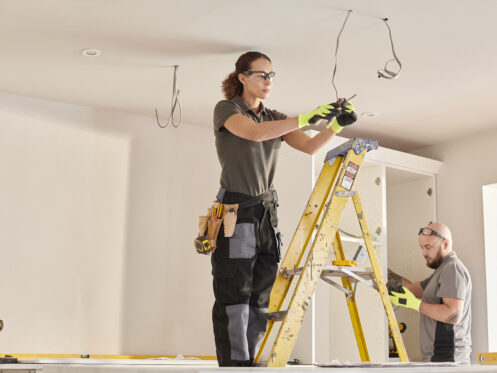According to the U.S. Consumer Product Safety Commission, more than 31,000 electrical fires occur throughout the nation each year. Thus, one of the best things that you can do to protect your Tacoma, WA home is to practice electrical safety. With faulty wiring and connected electrical equipment responsible for two-thirds of these events, there’s a lot that you can do to both prevent and mitigate disaster. Following are 10 electrical safety tips to help you get started.
1. Use Space Heaters and Portable Air Conditioners the Right Way
Many older homes in Pierce County lack fixed, permanent cooling solutions. Some even have simple baseboard heaters or wall heaters for wintertime heating. Although these properties meet the minimum legal requirements for habitability, they aren’t always comfortable to be in during times of extreme weather. If you’re supplementing your current heating and cooling equipment by plugging in space heaters or portable air conditioners, it’s important to do so safely.
When active, space heaters should never be unattended. Moreover, you should always plug these units directly into electrical outlets rather than using them with extension cords. It’s also important to replace space heaters regularly. Never use an old space heater that you’ve purchased at a garage sale or thrift store. Instead, opt for a new model with advanced safety features and a fully intact cord.
Although portable air conditioners are far less of a fire hazard than space heaters, these units use a lot of electricity. It’s vital to make sure that yours isn’t overloading the circuit that it’s used on. If you plug a portable AC in and your lights flicker or dim, move to a different outlet or area of the building or relocate other appliances in the space. Like space heaters, portable air conditioners should always be plugged directly into wall outlets.
2. Schedule Whole-House Electrical Inspections Every Five to 10 Years
In general, homeowners should have their electrical systems professionally inspected once every 10 years. However, certain building and household-specific factors may make it necessary to schedule these appointments every five years. For instance, you should have an electrician review your home’s wiring every five years if your household is fast-growing. With more people living in the home, you’re virtually guaranteed to have more devices and appliances plugged in. As household sizes increase, electricity demand rises as well. These changes may make it necessary to refine your home’s electrical system.
Major pest infestations are another good reason to schedule electrical inspections before 10 full years have passed. Rats, mice, and other small animals are known to chew through wiring and cause other in-wall electrical damage. However, bed bugs, termites, and other insects can cause electrical problems too. If you’ve just had a major pest infestation treated, have an electrician make sure that your electrical system is unaffected.
3. Never Overload Your Outlets
You likely have an overloaded outlet if the circuit breaker for the area frequently trips. However, you should also be on the lookout for signs like:
- Outlets that are warm or hot to the touch
- Thin, whitish smoke coming from outlets
- Burnt and slightly sweet-smelling odors at outlets or behind walls
- Soot or singe marks
If you live in an older home that still has two-pronged outlets, you might notice these things even when your devices and appliances are plugged in correctly and have their own dedicated outlets. In this case, these are indications of an outdated electrical system. Upgrading to three-pronged outlets or outlets with grounding prongs will enhance the electrical safety of your home and aptly accommodate your modern appliances.
4. Give Your Appliances and Devices Adequate Clearance
For aesthetic purposes or for space-saving, you might have your gaming computer, television, or other electronics positioned close to walls or nearby furnishings. All of the heat-generating devices and appliances in your home should always have sufficient clearance on all sides. This way, when they vent their heat, it has somewhere to go. You can find the recommended amount of clearance for each item in your home by reading the corresponding owner’s manual. Maintaining adequate clearance will extend the lifespan of your electronics, limit the risk of overheating, and prevent electrical fires.
5. Don’t Ignore the Signs of Developing Electrical Problems
One of the most important electrical safety tips for Tacoma homeowners is to schedule timely electrical inspections and repairs when suspected problems arise. Much like your home’s plumbing system, most of your electrical system is hidden behind drywall and other structural elements. As such, it’s easy to overlook and just as easy to outright ignore.
In addition to strange odors, smoke, and singe marks, be on the lookout for:
- Outlets that spark
- Buzzing sounds in your walls or at your circuit breaker box
- Lights that randomly grow dim
When an outlet fails to work or fails to work without issue, don’t simply move your lamp, laptop, or other electrically powered device to another outlet and put the issue out of your mind. Instead, contact a licensed electrician right away.
6. Practice Extension Cord Safety
Make sure that each extension cord you use is properly rated for the application. Don’t overload your extension cords, and don’t run them under carpeting or furnishings. More importantly, never attempt to staple or pin these cords down, and never “daisy chain” or link multiple extension cords together.
7. Have Ground-Fault Circuit Interrupters (GFCIs) Installed
High-moisture areas like your kitchen and bathrooms should have ground-fault circuit interrupters (GFCIs) installed. These outlets detect overloads and other electrical hazards, and they immediately shut down to prevent electrocution and fire. They’re standard additions to modern homes, but your home might lack them if it was built before 1971 or hasn’t had its electrical system updated in quite a while.
8. Regularly Clean All Exhaust Fans
All electricity-reliant items that produce exhaust should have their exhaust fans cleaned annually or as recommended. Much like giving heat-generating appliances adequate clearance, this will prevent overheating, short circuits, and electrical fires.
9. Update Your Home’s Electrical System Every 20 to 25 Years
As the years go by, the average number of devices that homeowners rely on increases. Most households have gone from having a single television for entertainment to having multiple laptops, tablets, and mobile phones. Many modern homes have massive theater rooms, advanced sound equipment, multi-pronged security systems, and more. Having your electrical system inspected every five to 10 years and updated every 20 to 25 years is the surest way to keep it on par with your needs.
10. Avoid Do-It-Yourself Electrical Installations
If you want your very own EV charging station or an all-new lighting plan, contact a licensed electrician rather than attempting to do it yourself. DIY electrical projects can result in your home insurance plan being voided, your home warranty, and other important protections. It can also leave you with a property that won’t pass lender inspections should you ever choose to sell. Working with general handymen and unlicensed electrical service providers also greatly undermines your home’s electrical safety.
We’re proud to serve residents of Tacoma, WA, and the greater Pierce County area. We offer HVAC, plumbing, sewer, drain, and electrical services. We also provide HVAC duct cleaning and advanced indoor air quality solutions. To schedule an appointment, get in touch with Hunt’s Services today!




